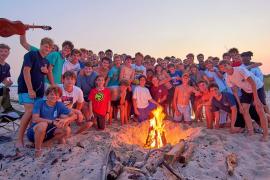Each camper will be different. They will come from different backgrounds, different family structures, and different socio-economic classes. However, just as they are different, they are the same. All children develop in basically the same way and share certain developmental traits with other children their age. If you understand the typical behavior for an age group, you may be able to determine what is appropriate behavior and then chart your best course of interaction with them.
The Elementary Years
Five-to-seven-year-old campers are curious and excited. They are learning to share and play cooperatively in small groups. They see the world as a place to be explored. Other typical behavioral traits include:
- a strong attachment to their home and family
- a short interest span
- an awareness mainly of themselves and their own desires
- a preference for imaginative, make-believe play
- curiosity, a desire to explore their expanding world
- a desire for repetition of enjoyable experiences
- being easily upset by changes in routine or environment
- boys and girls playing together readily
- depending on adults to meeting physical and emotional needs
- a need for patient understanding and close supervision
Beginning Independence
Seven-to-ten-year-old campers are beginning to socialize with children their own age. They want friendships and enjoy playing together. They also:
- are ready for a live-away experience
- have a longer attention span
- are aware of others and are willing to share
- desire acceptance from their peers
- need close friendship with playmate
- are able to express themselves freely in art forms and play
- desire better skills performance are interested in group games and activities
- want everyone to obey stated rules and regulations
- strongly identify with own sex and age group
The “Tween” Years
Not quite children and not quite teenagers, campers ages ten to twelve are beginning to gain more awareness of themselves and their skills. Making friends and being accepted by their peers is a growing concern. Campers in this age group also:
- have a strong desire for a live-away experience
- want to be together in groups and teams
- have the patience to work toward short-term goals
- form cliques and friendship with own sex and age group
- seek status through excellence in skills and knowledge of grown-up things
- are fairly competitive in team and individual activities
- have a growing concern with their physical size and appearance
- boys and girls can work and socialize in programs where they share planning responsibilities
- like to make, do, and collect things
- enjoy being mischievous and daring
Seeking Independence
Campers ages twelve to fifteen are becoming more independent, growing away from family ties and influences. However, they still want adult supervision and adult attention to their daily needs. Other traits include:
- a strong drive for conformity with own age group
- intense feelings and emotions
- being greatly influenced by popular adults and teenage idols
- rapidly changing interests and ambitions
- a long interest span and increasing capacity for self-discipline
- a preference for competition with outside groups over competition with friends
- idealism about the world at large
- concern with their personal appearance, self-consciousness and inhibition
- the start of puberty; girls begin to menstruate, boys’ sex glands begin to function actively
- boys and girls can work together on projects better than they can socialize
Impatient to Grow Up
Campers ages fifteen to seventeen are eager to grow up. They want independence and responsibility. At the same time, they are beginning to think about their future and possible career plans. Campers in this age group also:
- want to earn money for independence and freedom
- desire increased responsibility
- need to be treated as young adults
- occasionally revert to childish behavior
- are very critical of self
- seek prestige and belonging to the power group
- are able to concentrate and specialize in selected skills and interests
- expansive and changing ambitions
- are encountering a conflict between idealism and materialism
- develop crushes with depth of feeling
- tend to cover own weaknesses with similar weaknesses of the group
In addition to these characteristics, all children and teens want to know that they are respected, loved, and valued for who they are. Show campers that you care, and they will show you respect.
Originally published in the 1999 May/June issue of Camping Magazine.


